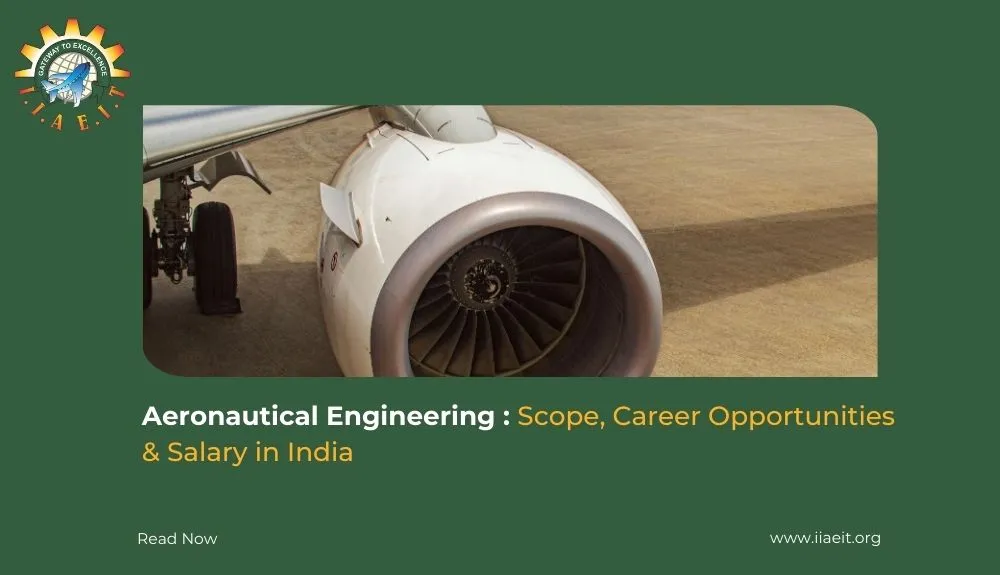
Introduction: What is Aeronautical Engineering?
The aeronautical engineering scope is expanding rapidly as advancements in aviation technology continue to reshape the industry. This engineering field focuses on designing, developing, testing, and maintaining aircraft operating within Earth’s atmosphere. Aeronautical engineers work on various components such as aerodynamics, propulsion systems, avionics, and structural design, ensuring aircraft are safe, efficient, and technologically advanced.
Overview of Aeronautical Engineering
Aeronautical engineering, a specialized branch of aerospace engineering, deals with studying and applying flight mechanics, jet engines, aircraft materials, and advanced navigation systems. The discipline is crucial in modern aviation by improving aircraft performance, fuel efficiency, and safety measures.
Importance of Aeronautical Engineering in Modern Aviation
- Enhances commercial and military aircraft design for better fuel efficiency and aerodynamics.
- Supports research and development in unmanned aerial vehicles (UAVs) and urban air mobility.
- Contributes to the safety and regulatory compliance of airlines and defence aircraft.
Difference Between Aeronautical and Aerospace Engineering
- Aeronautical Engineering: Focuses on designing and maintaining aircraft such as aeroplanes, helicopters, and drones operating within Earth’s atmosphere.
- Aerospace Engineering: This field covers both aeronautical and aerospace engineering, dealing with spacecraft, satellites, and space exploration technologies.
Aeronautical engineering scope is not just limited to designing aircraft but extends to air traffic control, avionics software development, and flight simulation technologies. With increasing air travel demand and technological advancements, this field presents immense career opportunities for aspiring engineers.
Aeronautical Engineering Scope: Career Growth & Opportunities
Does Aeronautical Engineering Have Scope?
The scope of aeronautical engineering is vast and continues to grow as the aviation industry advances. With an increasing demand for fuel-efficient, technologically advanced aircraft and rapid developments in defence, space exploration, and commercial aviation, aeronautical engineers have numerous career opportunities. This field is integral to designing and maintaining next-generation aircraft, ensuring safety, efficiency, and performance.
The aeronautical engineering scope is not limited to aircraft manufacturing but extends to areas such as air traffic management, avionics software development, flight testing, and drone technology. With governments and private enterprises investing heavily in air travel and aerospace innovations, this field offers promising career growth.
Expansion in Commercial Aviation, Defense, and Space Exploration
- Commercial Aviation
- Global airline fleets are expanding, increasing the need for aeronautical engineers.
- The development of electric and hybrid aircraft is creating new career opportunities.
- Companies like Boeing, Airbus, and Embraer are hiring aeronautical engineers for cutting-edge aircraft design and maintenance.
- Defence and Military Sector
- Aeronautical engineers contribute to developing fighter jets, surveillance aircraft, and UAVs.
- Governments worldwide invest in stealth technology, hypersonic flight, and autonomous air systems.
- Organizations like DRDO, HAL, and Lockheed Martin seek skilled engineers for defence projects.
- Space Exploration
- With increasing missions by NASA, ISRO, SpaceX, and Blue Origin, the role of aeronautical engineers in satellite technology and spacecraft design is growing.
- The push for hypersonic aircraft and reusable launch vehicles opens new career paths in aerodynamics and propulsion research.
Role of Emerging Technologies in Increasing Demand
The aeronautical engineering scope is expanding due to advancements in:
- Artificial Intelligence (AI) & Automation – Smart autopilot systems, AI-driven aircraft design.
- Electric & Hybrid Aviation – Zero-emission aircraft and alternative fuels.
- Urban Air Mobility (UAM) – Drones and air taxis for city transportation.
- Hypersonic Travel – High-speed aircraft exceeding Mach 5 speeds.
With the integration of AI, robotics, and sustainable aviation technologies, the demand for aeronautical engineers is set to rise, making this an excellent career choice for future engineers.
Is Aeronautical Engineering in Demand?
Yes, aeronautical engineering is in high demand, driven by rapid advancements in commercial aviation, space exploration, and military defence systems. With airlines pushing for fuel-efficient aircraft, space agencies expanding missions to Mars and beyond, and the rise of urban air mobility (UAM) with drones and air taxis, the need for aeronautical engineers has never been more significant. Countries like the USA, India, and the UAE are investing heavily in next-generation aircraft, hypersonic travel, and AI-driven automation, making this field a hotspot for innovation and high-paying careers. Whether designing supersonic jets, space shuttles, or autonomous UAVs, aeronautical engineers are at the forefront of reshaping the future of aviation.
Aeronautical Engineering Programs & Educational Pathways
A career in aeronautical engineering begins with the proper education and training. With advancements in aircraft design, space exploration, and AI-driven aviation, top universities offer specialized diploma, undergraduate, and postgraduate programs to equip students with the necessary skills.
Aeronautical Engineering Programs
- Diploma in Aeronautical Engineering (3 years) – Covers fundamental aviation mechanics, aerodynamics, and aircraft maintenance.
- B.Tech/B.E. in Aeronautical Engineering (4 years) – Focuses on aircraft design, propulsion, avionics, and computational simulations.
- M.Tech/M.S. in Aeronautical Engineering (2 years) – Advanced specialization in AI-driven aviation, UAV technology, and hypersonic flight.
IIAEIT (Indian Institute for Aeronautical Engineering & Information Technology) offer industry-focused aeronautical engineering programs. IIAEIT’s collaboration with Ajeenkya DY Patil University’s Dept. of Space Engineering ensures that students receive top-tier education and exposure to real-world aeronautical projects.
Core Subjects in Aeronautical Engineering
- Aerodynamics – Study of airflow, lift, and drag in aircraft.
- Propulsion Systems – Covers jet engines, rocket propulsion, and fuel technologies.
- Avionics & Flight Control – Navigation, autopilot, and aircraft communication systems.
- Aircraft Structures & Materials – Focuses on lightweight composite materials for aerospace applications.
- Flight Mechanics & Stability – Understanding aircraft control and manoeuvrability.
- Computational Fluid Dynamics (CFD) – Simulations to optimize aircraft performance.
- Space Technology (Optional) – Specialization in satellites and astronautics.
Some universities offer electives in AI-powered aviation, drone technology, and green aviation fuels to keep up with evolving industry trends.
Top Job Roles in Aeronautical Engineering
Aeronautical engineers can specialize in design, testing, maintenance, and operational roles across various domains in the aviation and aerospace sectors.
Key Job Roles:
- Aeronautical Design Engineer – Focuses on designing aircraft structures, aerodynamics, and materials for lightweight, high-performance aircraft.
- Aircraft Maintenance Engineer – Ensures aircraft safety, reliability, and efficiency by conducting regular inspections and repairs.
- Flight Test Engineer – Evaluates aircraft performance and safety by conducting tests and analyzing real-time flight data.
- Avionics Engineer – Works on navigation, control systems, and onboard electronics for aircraft and spacecraft.
- Propulsion Engineer – Specializes in designing and testing jet engines, rocket propulsion, and hybrid fuel systems.
- UAV (Drone) Engineer – Develops and optimizes unmanned aerial vehicles (UAVs) and drone technology for commercial, military, and research applications.
- Air Traffic Controller – Manages and directs aircraft movements to ensure safe and efficient air traffic operations.
- Aerospace Systems Engineer – Works on integrating AI, robotics, and automated systems into next-generation aircraft and spacecraft.
Industries Hiring Aeronautical Engineers
Aeronautical engineers have career opportunities in aircraft manufacturing, defence, research, and maintenance organizations worldwide.
Top Industries Employing Aeronautical Engineers:
- Commercial Airlines & Aircraft Manufacturers – Boeing, Airbus, Embraer, Bombardier, Rolls-Royce Aerospace.
- Defence & Space Organizations – NASA, ISRO, DRDO, HAL, Lockheed Martin, SpaceX.
- MRO (Maintenance, Repair, Overhaul) Companies – General Electric Aviation, Lufthansa Technik, Pratt & Whitney.
- Research & Development (AI & Aviation Tech) – AI-driven flight simulation companies, drone technology firms, and sustainable aviation startups.
With the rise of green aviation, urban air mobility (UAM), and hypersonic travel, aeronautical engineers are increasingly needed in AI-driven aviation startups, electric aircraft companies, and space exploration firms.
Aeronautical Engineering Salary Overview
| Region/Experience Level | Entry-Level Salary (Per Annum) | Mid-Level (5-10 years) | Senior-Level (10+ years) |
| India | ₹6 – 12 LPA | ₹15 – 25 LPA | ₹30 – 50 LPA+ |
| USA | $70,000 – $90,000 | $100,000 – $130,000 | $150,000+ |
| Europe | €55,000 – €80,000 | €90,000 – €120,000 | €140,000+ |
| UAE | AED 180,000 – AED 250,000 | AED 300,000 – AED 450,000 | AED 500,000+ |
Future Trends Impacting Aeronautical Engineering Salaries
- The demand for AI-powered aviation, autonomous aircraft, and electric propulsion drives salary growth in specialized aeronautical roles.
- Drone technology and urban air mobility (UAM) create high-paying job opportunities in the UAV sector.
- Hypersonic travel and space exploration generate new, highly lucrative positions for aeronautical engineers in NASA, ISRO, and private space tech firms.
As aviation technology evolves, aeronautical engineers with advanced skills in AI, automation, and green technology will have higher earning potential and global career opportunities.
Challenges in Aeronautical Engineering
Aeronautical engineering is a highly specialized field requiring aerodynamics, propulsion, avionics, and flight mechanics expertise. To remain competitive, engineers must stay updated with AI-driven aviation, hypersonic travel, and drone automation.
Key Challenges:
- High Specialization Requirements – Requires advanced technical knowledge and continuous skill upgrades.
- Safety Regulations & Compliance – Strict adherence to DGCA, FAA, and EASA guidelines, making aircraft design complex.
- Competitive Job Market – Fewer opportunities than in broader fields like mechanical engineering; requires hands-on experience and certifications.
Despite these challenges, global investments in sustainable aviation, AI, and space travel drive demand for skilled aeronautical engineers.
Conclusion
Aeronautical engineering is an exciting and rewarding career with vast opportunities in commercial aviation, defence, and space exploration. The scope of aeronautical engineering continues to expand as new technologies emerge, increasing the demand for skilled professionals.
If you’re passionate about aircraft, technology, and innovation, consider enrolling in a program like IIAEIT’s aeronautical engineering programs to kickstart your journey into this high-flying career!
Frequently Asked Questions (FAQs)
What is the future scope of aeronautical engineering?
Aeronautical engineering has a substantial future scope with increasing developments in sustainable aviation, drone technology, and hypersonic travel. Engineers with AI-driven aviation and space technology expertise will have high career growth opportunities.
Does aeronautical engineering have scope in India and abroad?
Yes, India has growing opportunities in ISRO, DRDO, HAL, and commercial airlines. Globally, companies like NASA, Boeing, Airbus, SpaceX, and Rolls-Royce Aerospace are actively hiring aeronautical engineers.
What industries can aeronautical engineers work in?
Aeronautical engineers find opportunities in commercial aviation, defence, space research, UAV technology, air traffic control, and AI-powered aviation startups.
Is aeronautical engineering in demand?
Yes, the demand for aeronautical engineers is increasing due to rapid advancements in aircraft technology, electric aviation, space missions, and AI integration in aerospace systems.
Aeronautical engineering remains a highly specialized and innovative, offering exciting career prospects for engineers passionate about aviation and aerospace technology.

